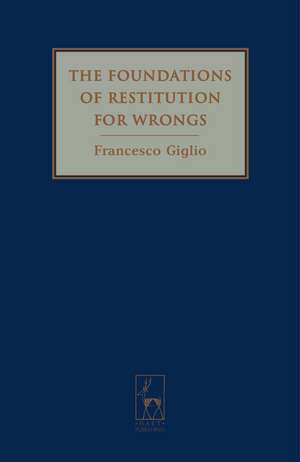The Foundations of Restitution for Wrongs
Autor Francesco Giglioen Limba Engleză Hardback – 5 mar 2007
Preț: 569.60 lei
Preț vechi: 662.33 lei
-14% Nou
Puncte Express: 854
Preț estimativ în valută:
108.99€ • 113.57$ • 90.25£
108.99€ • 113.57$ • 90.25£
Carte tipărită la comandă
Livrare economică 03-17 aprilie
Preluare comenzi: 021 569.72.76
Specificații
ISBN-13: 9781841136479
ISBN-10: 1841136476
Pagini: 262
Dimensiuni: 156 x 234 x 20 mm
Greutate: 0.54 kg
Ediția:New.
Editura: Bloomsbury Publishing
Colecția Hart Publishing
Locul publicării:London, United Kingdom
ISBN-10: 1841136476
Pagini: 262
Dimensiuni: 156 x 234 x 20 mm
Greutate: 0.54 kg
Ediția:New.
Editura: Bloomsbury Publishing
Colecția Hart Publishing
Locul publicării:London, United Kingdom
Caracteristici
This study considers the basic structure of restitutionary damages from different angles. In part one, the topic is analysed from a comparative perspective. In part two, a theory of restitution for wrongs as corrective justice is developed.
Notă biografică
Francesco Giglio is a Senior Lecturer in Law at the University of Manchester.
Cuprins
Introduction 1 Terminology and Introduction to the Concept of Restitution for WrongsI First Things First II Restitution III Wrong IV Setting the Terminological Premises 2 Restitution in the Context of the Law of Obligations I Legal Analysis II Some Remarks 3 Comparative Analysis: Proprietary and Intellectual Property Wrongs I Organisation of the Analysis II Proprietary Wrongs III Intellectual Property Wrongs 4 Comparative Analysis: Breach of Contract I English Law II German Law III Italian Law 5 Comparative Analysis: Other Wrongs and Concluding Observations I Other Wrongs II Concluding Observations 6 The Roman Law of Damages I The Role of Non-Compensatory Responses II Legal Responses to Wrongs III The Punitive Character of the Roman Law of Delict IV Penal and Compensatory Actions VI Evolution of the Law of Damages in the Post-Classical Period VII The Law of Damages in the Ius Commune VIII Some Reflections 7 The Law of Damages in the Tradition of Aristotelian Philosophy I Introduction II The Aristotelian Approach to Responses to Wrongdoing III Aristotelian Theory and Law of Damages IV The Influence of Philosophical Analysis over Legal Interpretation 8 Modern Aristotelian Approaches to Restitution for Wrongs I Introduction II German Legal Theory and Aristotelian Justice III A Moral Instrumentalist Theory on the Law of Damages IV A Moral Formalist Theory on the Law of Damages V Corrective Justice and Restitution for Wrongs 9 Wrongs and Restitution I Introduction II Birks' Three Tests III Protection of Facilitative Institutions IV General Acceptance V Position of the Law Commission VI Restitution Disgorgement and Deterrence VII The Requirements of the Claim VIII The Object of the Restitutionary Claim IX Election between Compensation and Restitution X The Neutrality of Restitution for Wrongs XI The A Fortiori Argument XII Conclusions 10 Final ObservationsI The Outcome of the Research II The Chosen Avenue III Law of Obligations and Restitution for Wrongs IV The Comparative Perspective V The Historical Perspective VI The Philosophical Perspective
Descriere
This book explores the structure of restitutionary damages from various angles and develops a theory of restitution for wrongs as corrective justice.
